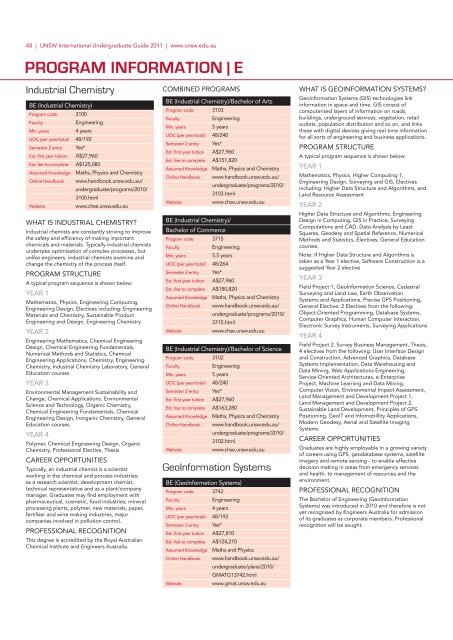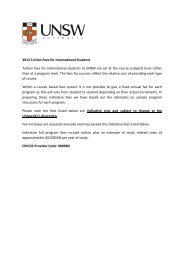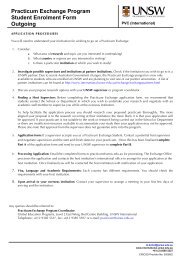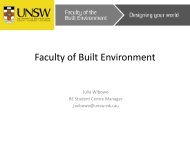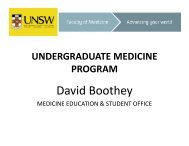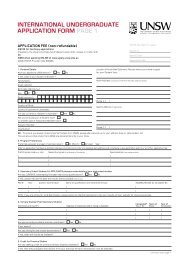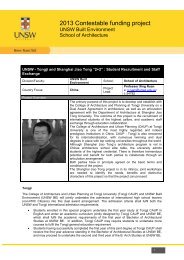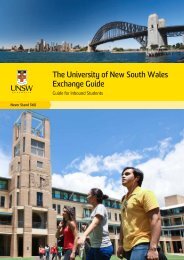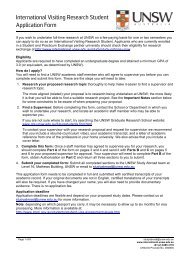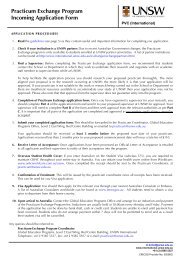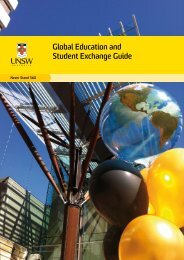undergraduate - UNSW International - The University of New South ...
undergraduate - UNSW International - The University of New South ...
undergraduate - UNSW International - The University of New South ...
Create successful ePaper yourself
Turn your PDF publications into a flip-book with our unique Google optimized e-Paper software.
48 | <strong>UNSW</strong> <strong>International</strong> Undergraduate Guide 2011 | www.unsw.edu.auprogram information | EIndustrial ChemistryBE (Industrial Chemistry)Program code 3100FacultyMin. yearsEngineering4 yearsUOC (per year/total) 48/192Semester 2 entryEst. first year tuitionEst. fee to completeYes*A$27,960A$125,080Assumed Knowledge Maths, Physics and ChemistryOnline HandbookWebsitewww.handbook.unsw.edu.au/<strong>undergraduate</strong>/programs/2010/3100.htmlwww.chse.unsw.edu.auWhat is Industrial Chemistry?Industrial chemists are constantly striving to improvethe safety and efficiency <strong>of</strong> making importantchemicals and materials. Typically industrial chemistsundertake optimisation <strong>of</strong> complex processes, butunlike engineers, industrial chemists examine andchange the chemistry <strong>of</strong> the process itself.Program StructureA typical program sequence is shown below:Year 1Mathematics, Physics, Engineering Computing,Engineering Design, Electives including: EngineeringMaterials and Chemistry, Sustainable ProductEngineering and Design, Engineering ChemistryYear 2Engineering Mathematics, Chemical EngineeringDesign, Chemical Engineering Fundamentals,Numerical Methods and Statistics, ChemicalEngineering Applications, Chemistry, EngineeringChemistry, Industrial Chemistry Laboratory, GeneralEducation coursesYear 3Environmental Management Sustainability andChange, Chemical Applications, EnvironmentalScience and Technology, Organic Chemistry,Chemical Engineering Fundamentals, ChemicalEngineering Design, Inorganic Chemistry, GeneralEducation coursesYear 4Polymer, Chemical Engineering Design, OrganicChemistry, Pr<strong>of</strong>essional Elective, <strong>The</strong>sisCareer OpportunitiesTypically, an industrial chemist is a scientistworking in the chemical and process industries:as a research scientist, development chemist,technical representative and as a plant/companymanager. Graduates may find employment withpharmaceutical, cosmetic, food industries; mineralprocessing plants, polymer, new materials, paper,fertiliser and wine making industries, majorcompanies involved in pollution control.Pr<strong>of</strong>essional RecognitionThis degree is accredited by the Royal AustralianChemical Institute and Engineers Australia.Combined ProgramsBE (Industrial Chemistry)/Bachelor <strong>of</strong> ArtsProgram code 3103FacultyEngineeringMin. years 5 yearsUOC (per year/total) 48/240Semester 2 entry Yes*Est. first year tuition A$27,960Est. fee to complete A$151,820Assumed Knowledge Maths, Physics and ChemistryOnline Handbook www.handbook.unsw.edu.au/<strong>undergraduate</strong>/programs/2010/3103.htmlWebsitewww.chse.unsw.edu.auBE (Industrial Chemistry)/Bachelor <strong>of</strong> CommerceProgram code 3715FacultyEngineeringMin. years 5.5 yearsUOC (per year/total) 48/264Semester 2 entry Yes*Est. first year tuition A$27,960Est. fee to complete A$180,820Assumed Knowledge Maths, Physics and ChemistryOnline Handbook www.handbook.unsw.edu.au/<strong>undergraduate</strong>/programs/2010/3715.htmlWebsitewww.chse.unsw.edu.auBE (Industrial Chemistry)/Bachelor <strong>of</strong> ScienceProgram code 3102FacultyEngineeringMin. years 5 yearsUOC (per year/total) 48/240Semester 2 entry Yes*Est. first year tuition A$27,960Est. fee to complete A$163,280Assumed Knowledge Maths, Physics and ChemistryOnline Handbook www.handbook.unsw.edu.au/<strong>undergraduate</strong>/programs/2010/3102.htmlWebsitewww.chse.unsw.edu.auGeoInformation SystemsBE (GeoInformation Systems)Program code 3742FacultyEngineeringMin. years 4 yearsUOC (per year/total) 48/192Semester 2 entry Yes*Est. first year tuition A$27,810Est. fee to complete A$124,210Assumed Knowledge Maths and PhysicsOnline Handbook www.handbook.unsw.edu.au/<strong>undergraduate</strong>/plans/2010/GMATG13742.htmlWebsitewww.gmat.unsw.edu.auWhat is Geoinformation systems?GeoInformation Systems (GIS) technologies linkinformation in space and time. GIS consist <strong>of</strong>computerised layers <strong>of</strong> information on roads,buildings, underground services, vegetation, retailoutlets, population distribution and so on, and linksthese with digital devices giving real time informationfor all sorts <strong>of</strong> engineering and business applications.Program StructureA typical program sequence is shown below:Year 1Mathematics, Physics, Higher Computing 1,Engineering Design, Surveying and GIS, Electivesincluding: Higher Data Structure and Algorithms, andLand Resource AssessmentYear 2Higher Data Structure and Algorithms, EngineeringDesign in Computing, GIS in Practice, SurveyingComputations and CAD, Data Analysis by LeastSquares, Geodesy and Spatial Reference, NumericalMethods and Statistics, Electives, General Educationcourses.Note: If Higher Data Structure and Algorithms istaken as a Year 1 elective, S<strong>of</strong>tware Construction is asuggested Year 2 electiveYear 3Field Project 1, GeoInformation Science, CadastralSurveying and Land Law, Earth ObservationSystems and Applications, Precise GPS Positioning,General Elective, 2 Electives from the following:Object-Oriented Programming, Database Systems,Computer Graphics, Human Computer Interaction,Electronic Survey Instruments, Surveying ApplicationsYear 4Field Project 2, Survey Business Management, <strong>The</strong>sis,4 electives from the following: User Interface Designand Construction, Advanced Graphics, DatabaseSystems Implementation, Data Warehousing andData Mining, Web Applications Engineering,Service-Oriented Architectures, e-EnterpriseProject, Machine Learning and Data Mining,Computer Vision, Environmental Impact Assessment,Land Management and Development Project 1,Land Management and Development Project 2,Sustainable Land Development, Principles <strong>of</strong> GPSPositioning, GeoIT and Infomobillity Applications,Modern Geodesy, Aerial and Satellite ImagingSystemsCareer OpportunitiesGraduates are highly employable in a growing variety<strong>of</strong> careers using GPS, geodatabase systems, satelliteimagery and remote sensing - to enable effectivedecision making in areas from emergency servicesand health, to management <strong>of</strong> resources and theenvironment.Pr<strong>of</strong>essional Recognition<strong>The</strong> Bachelor <strong>of</strong> Engineering (GeoInformationSystems) was introduced in 2010 and therefore is notyet recognised by Engineers Australia for admission<strong>of</strong> its graduates as corporate members. Pr<strong>of</strong>essionalrecognition will be sought.


